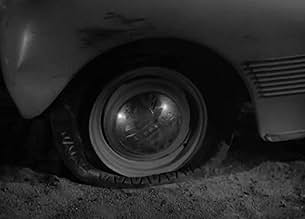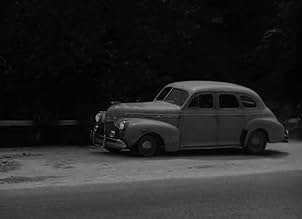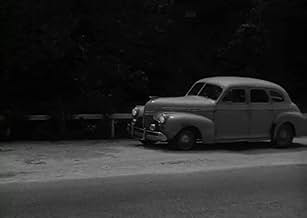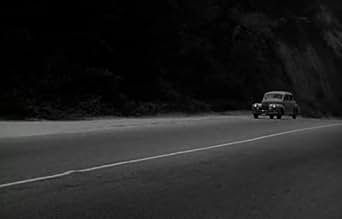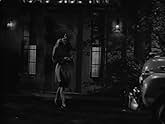IMDb RATING
6.7/10
2.3K
YOUR RATING
A mortally-wounded female gangster recounts how she and her gang revived an executed killer from the gas chamber to try to find out where he buried a fortune in cash.A mortally-wounded female gangster recounts how she and her gang revived an executed killer from the gas chamber to try to find out where he buried a fortune in cash.A mortally-wounded female gangster recounts how she and her gang revived an executed killer from the gas chamber to try to find out where he buried a fortune in cash.
Jean Gillie
- Margot Shelby
- (as Miss Jean Gillie)
Philip Van Zandt
- Tommy
- (as Phil Van Zandt)
Walden Boyle
- Chaplain
- (uncredited)
Martin Cichy
- Policeman
- (uncredited)
Tom Coleman
- Trucker at Roadside Inn
- (uncredited)
Franco Corsaro
- Kelsey
- (uncredited)
Madge Crane
- First Visitor
- (uncredited)
Dick Elliott
- Driver
- (uncredited)
Virginia Farmer
- Georgia - Margot's Maid
- (uncredited)
- Director
- Writers
- All cast & crew
- Production, box office & more at IMDbPro
Featured reviews
And makes Barbara Stanwyck and Ann Savage look like Ned(Jane?)in the first reader in the process. And, in "Decoy", femme fatality is a more apt term as all the male characters she encounters have less chance of surviving than Elisha Cook Jr. did going against Jack Palance in "Shane"...zip,nada,none,nought,zap and gone. Sheldon Leonard survives an encounter but only because she is dying when he shows up. The surprise is that she didn't take him out on the way out. Repeated viewings still figure him for no better than even at that. The taglines and blurbs on the posters and ads paint the following picture of her Margot Shelby character: "SHE TREATS MEN THE WAY THEY'VE BEEN TREATING WOMEN FOR YEARS!" Another line defines that as; "She Two-Times, Steals, Cheats, Double-Crosses...Anything To Get What She Wants...and then KISSES THEM OFF." Actually, she runs a car over Edward Norris, which was lack of good judgement on his part for hanging around with a broad known for..."kissing quick and killing quicker." She takes doctor Herbert Rudley away from Marjorie Woodworth,as she needs him to revive her just-executed in the gas chamber boy friend---no lack of plot in this one---which accounts for the only credibility gap in the film...somebody please tell me why Marjorie Woodworth wanted Herbert Rudley in the first place. Good riddance,Marjorie, you can do better although, come to think of it, you seldom did. Gillie gives Rudley a shovel, makes him dig up the buried money and then, in payment for past favors and services, shoots him dead. She had to double check to make certain as there wasn't much difference in his performance either way. Bottom line: Jean Gillie gets a wing to herself in the Femme Fatale Hall of Fame.
1946's Decoy is a fascinating noir, directed by Jack Bernhard, whose intention it was to showcase his wife, Jean Gille, for American audiences. Gille had worked since 1935 in British films.
Unfortunately, two things happened to railroad Gille's career - she and Bernhard divorced, and then she died of pneumonia three years after this film was made.
Tall, slender, with silky blond hair and a British accent, Gille has a formidable role here as the noir femme fatale, Margot Shelby, who will stop at nothing to find and possess $400,000 a death row killer has hidden.
To that end, she plays all ends against the middle. He plans to go to his grave with his secret, determined to be the only person who will ever spend that money. No matter how much he loves Margot, he won't tell her where it is.
Margot finds out that methylene blue is the antidote for the gas used to execute prisoners and convinces a doctor (Herbert Rudley), who works at the prison, to administer it after the execution.
Once you're dead, you're dead, except in this film, I guess. Well, somehow, the doc revives this guy, and Margot, the reluctant doctor, and her boyfriend (Edward Norris) go after the loot.
The story is told in flashback by Margot to Sergeant Portugal (Sheldon Leonard), though at the start of the film, we see the segment leading up to Margot telling her story. I actually went back and watched the beginning over.
Gille is tough as nails, and while her acting style is overt, it's perfect for this type of film. She might have enjoyed a career as a noir femme fatale in the U. S. were it not for her misfortune. Good movie, if you can buy resurrection.
Unfortunately, two things happened to railroad Gille's career - she and Bernhard divorced, and then she died of pneumonia three years after this film was made.
Tall, slender, with silky blond hair and a British accent, Gille has a formidable role here as the noir femme fatale, Margot Shelby, who will stop at nothing to find and possess $400,000 a death row killer has hidden.
To that end, she plays all ends against the middle. He plans to go to his grave with his secret, determined to be the only person who will ever spend that money. No matter how much he loves Margot, he won't tell her where it is.
Margot finds out that methylene blue is the antidote for the gas used to execute prisoners and convinces a doctor (Herbert Rudley), who works at the prison, to administer it after the execution.
Once you're dead, you're dead, except in this film, I guess. Well, somehow, the doc revives this guy, and Margot, the reluctant doctor, and her boyfriend (Edward Norris) go after the loot.
The story is told in flashback by Margot to Sergeant Portugal (Sheldon Leonard), though at the start of the film, we see the segment leading up to Margot telling her story. I actually went back and watched the beginning over.
Gille is tough as nails, and while her acting style is overt, it's perfect for this type of film. She might have enjoyed a career as a noir femme fatale in the U. S. were it not for her misfortune. Good movie, if you can buy resurrection.
Jean Gillie (Margot) devises a plan to spring her lover Robert Armstrong (Frank) from prison. She gets help for her plan from Edward Norris (Jim) and an unwilling Herbert Rudley (Dr Craig)). The idea is to get Armstrong to locate some hidden money for them to share. However, there are ulterior motives at play......
Methylene blue is at the centre of this story. It is used in the plot to revive Robert Armstrong after he has been killed as it is an antidote to cyanide poisoning. However, be careful if you want to experiment on someone you don't like very much as it serves as an antidote to the poison while you are living and not after you have died. It takes nothing away from the good idea for the plot though. However, poor Robert Armstrong doesn't live for very long after he is revived and so we don't get to see the side-effects of this drug, which turns your urine green and makes the whites of your eyes blue - we would then have been in a completely different film genre, possibly a comedy horror.
The cast do well despite 3 of them not being very good at acting - Jean Gillies, Herbert Rudley and, in a minor part, Marjorie Woodworth. Jean Gillies, while she is the driving force behind the film is either very good as demonstrated by her ruthlessness while at the steering wheel on the way to dig up the money and her determined self-confidence as she knows what she needs to do, or dreadfully unconvincing as in her scene when she talks about coming from the dirty street to which she never wants to return (her posh Kensington accent fools nobody - she's NEVER been a girl from the streets) and her insane encouragement to Herbert Rudley to dig for the money. Her OTT hysterics are not convincing in both these examples. It is funny to watch, though. Herbert Rudley plays a broken man for most of the film and comes across as a wet fish which is frustrating, although he comes good right at the beginning when he finally becomes a man and pulls a trigger. Still, he is annoying to watch for most of the time as this story unfolds in flashback. As for Marjorie Woodworth who plays Rudley's nurse and girlfriend.....ha ha ha....she's just terrible.
The film is well-paced and atmospheric, eg, the scene when Herbert Rudley is reviving Robert Armstrong and the scene where Jean Gillies engineers a flat tyre situation as she, Rudley and Norris make it to the location where the loot is buried. It is a shame that the film has been cut as it would have been far more powerful and disturbing to see Gillies do what she does to Norris twice as originally filmed as opposed to the one time she does it (which is shocking enough). And her laughter as she fools Sheldon Leonard who plays Sergeant Joe Portugal provides a memorable ending. She was one mean bitch.
The acting is sometimes wooden, the dialogue is sometimes woeful (a very annoying comedy duo at the morgue provide an example of this along with the claptrap speech about coming from that dirty street that Gillies delivers), a posh English accent seems a wrong choice for the lead role and the music is sometimes way too over dramatic but somehow, it doesn't seem to matter. What would normally be a recipe for disaster strangely has a very different effect and produces an entertaining film.
It is sad to discover that in real life, Jean Gillies died of pneumonia 3 years later in 1949 in London.
Methylene blue is at the centre of this story. It is used in the plot to revive Robert Armstrong after he has been killed as it is an antidote to cyanide poisoning. However, be careful if you want to experiment on someone you don't like very much as it serves as an antidote to the poison while you are living and not after you have died. It takes nothing away from the good idea for the plot though. However, poor Robert Armstrong doesn't live for very long after he is revived and so we don't get to see the side-effects of this drug, which turns your urine green and makes the whites of your eyes blue - we would then have been in a completely different film genre, possibly a comedy horror.
The cast do well despite 3 of them not being very good at acting - Jean Gillies, Herbert Rudley and, in a minor part, Marjorie Woodworth. Jean Gillies, while she is the driving force behind the film is either very good as demonstrated by her ruthlessness while at the steering wheel on the way to dig up the money and her determined self-confidence as she knows what she needs to do, or dreadfully unconvincing as in her scene when she talks about coming from the dirty street to which she never wants to return (her posh Kensington accent fools nobody - she's NEVER been a girl from the streets) and her insane encouragement to Herbert Rudley to dig for the money. Her OTT hysterics are not convincing in both these examples. It is funny to watch, though. Herbert Rudley plays a broken man for most of the film and comes across as a wet fish which is frustrating, although he comes good right at the beginning when he finally becomes a man and pulls a trigger. Still, he is annoying to watch for most of the time as this story unfolds in flashback. As for Marjorie Woodworth who plays Rudley's nurse and girlfriend.....ha ha ha....she's just terrible.
The film is well-paced and atmospheric, eg, the scene when Herbert Rudley is reviving Robert Armstrong and the scene where Jean Gillies engineers a flat tyre situation as she, Rudley and Norris make it to the location where the loot is buried. It is a shame that the film has been cut as it would have been far more powerful and disturbing to see Gillies do what she does to Norris twice as originally filmed as opposed to the one time she does it (which is shocking enough). And her laughter as she fools Sheldon Leonard who plays Sergeant Joe Portugal provides a memorable ending. She was one mean bitch.
The acting is sometimes wooden, the dialogue is sometimes woeful (a very annoying comedy duo at the morgue provide an example of this along with the claptrap speech about coming from that dirty street that Gillies delivers), a posh English accent seems a wrong choice for the lead role and the music is sometimes way too over dramatic but somehow, it doesn't seem to matter. What would normally be a recipe for disaster strangely has a very different effect and produces an entertaining film.
It is sad to discover that in real life, Jean Gillies died of pneumonia 3 years later in 1949 in London.
What a great B movie. In the powerful opening minutes, a wounded man hitchhikes to a San Francisco hotel, where he shoots an unarmed woman (Jean Gillie) and dies. While she lay dying, the woman tells a police detective (Sheldon Leonard) the events that led up to this. Her killer was a doctor she had duped into helping her bring her executed convict boyfriend back to life (!) so she could find out where he had stashed some loot. All through her story, it becomes clear this woman is pretty heartless and sadistic.
Jean Gillie was married to this film's director. This was his attempt to make her a star. Unfortunately nobody really became a star making pictures for Monogram, no matter how good they may have been. A short time later the pair divorced and Gillie moved back to England. She died there of pneumonia at the age of 33, just 3 years after this was released. Gillie showed how much potential she had in this movie. It's a shame her life was cut so short. Nice to see Sheldon Leonard playing a detective. He was usually playing tough gangsters. He's plenty tough here, even if he is on the right side of the law. Edward Norris and Herbert Rudley are both good. Robert Armstrong, the biggest name in the picture at the time, has little screen time as the executed boyfriend but does well with what he has.
Exceptional film noir from Monogram, a Poverty Row studio not known for much that was exceptional. There are a lot of memorable moments in this one. The beginning and ending are really great. The atmospheric scene where Armstrong is brought back to life is another highlight. With a couple of changes this could have easily been turned into a horror movie like The Man They Could Not Hang. It's definitely one you'll want to check out.
Jean Gillie was married to this film's director. This was his attempt to make her a star. Unfortunately nobody really became a star making pictures for Monogram, no matter how good they may have been. A short time later the pair divorced and Gillie moved back to England. She died there of pneumonia at the age of 33, just 3 years after this was released. Gillie showed how much potential she had in this movie. It's a shame her life was cut so short. Nice to see Sheldon Leonard playing a detective. He was usually playing tough gangsters. He's plenty tough here, even if he is on the right side of the law. Edward Norris and Herbert Rudley are both good. Robert Armstrong, the biggest name in the picture at the time, has little screen time as the executed boyfriend but does well with what he has.
Exceptional film noir from Monogram, a Poverty Row studio not known for much that was exceptional. There are a lot of memorable moments in this one. The beginning and ending are really great. The atmospheric scene where Armstrong is brought back to life is another highlight. With a couple of changes this could have easily been turned into a horror movie like The Man They Could Not Hang. It's definitely one you'll want to check out.
Given this film’s rarity (it went unseen for 30 years), I guess even self-confessed film nuts could be excused for never having heard of it – that is, until its announcement as part of Warners’ fourth “Film Noir Collection” on DVD. While some of the pairings in that 10-Movie 5-Disc Set were done without rhyme or reason – and it had seemed to me to be so here as well! – the film actually had a connection to its companion piece, CRIME WAVE (1954; which I’ve just watched a couple of days ago), via the credit on both of blacklisted scriptwriter/actor Nedrick Young (he appeared in the latter but only wrote DECOY).
Being a Monogram production, the film wears its Poverty Row status on its sleeve – with a bizarre plot (involving the re-animation of the dead: this has to be the only vintage crime outing to take the genre into the realm of sci-fi!), gritty look and second-rate cast – but which it generally manages to turn in its favor. In my review for CRIME WAVE itself, I had written how surprised I was that the film proved to be so good – this, then, came as even more of a shock (joining the ranks of such ramshackle ‘B’ noir gems as DETOUR, DILLINGER {both 1945} and GUNMAN IN THE STREETS [1950])! The film was devised as a showcase for British actress Jean Gillie by her husband, director Bernhard – however, the couple would divorce soon after and (even more sadly) Gillie herself would be dead of pneumonia in just a couple of years’ time! Still, hers is one of the most unscrupulous femme fatales ever conceived – ensnaring practically the entire male cast in her obsessive pursuit of money – and which she plays in a slightly overstated (but, under the circumstances, entirely fitting) manner.
The rest of the cast includes Edward Norris as Gillie’ crooked associate, Robert Armstrong as her ageing gangster boyfriend currently on Death Row and the only one who knows the location of a stashed cache' containing $400,000, Herbert Rudley as the small-town doctor enticed by Gillie into her unholy revivification scheme, and Sheldon Leonard as the cagey and dogged cop on their trail. Norris is somewhat stiff, while Armstrong (the original Carl Denham of “King Kong” fame) brings his typical zest to the role of love-struck and over-the-hill duped mobster – but both Rudley (bemoaning his betrayal of the code governing his profession) and Leonard (secretly enamored of Gillie himself, he’s willing to answer her plea at the moment of death to “stoop to her level”…but she just laughs in his face!) match the lady’s display of cool elegance disguising an essentially hard-boiled nature. Incidentally, Gillie’s character anticipated such celebrated noir bad girls of the ‘deadly sweet’ variety as Jane Greer in OUT OF THE PAST (1947) and Peggy Cummins (coincidentally, another British actress) in GUN CRAZY (1950) – but also Gaby Rodgers in KISS ME DEADLY (1955) in view of her similar histrionic outburst when finally laying hands on the long sought-after object of contention.
Unfortunately, it’s been revealed that the print of DECOY utilized for the DVD is slightly censored: one of the main characters is trampled no less than three times by a car which has Gillie at the wheel – however, we only get to see this once in the current version! For the record, Bernhard (whose first directorial effort this was) had been an executive at Universal – responsible for such popular ‘B’ horror outings as HORROR ISLAND and MAN-MADE MONSTER (1941; which I still haven’t managed to check out!). Finally, I’m to follow DECOY with another noir of his – the evocatively-titled BLONDE ICE (1948), via the “Special Edition” released by VCI…
Being a Monogram production, the film wears its Poverty Row status on its sleeve – with a bizarre plot (involving the re-animation of the dead: this has to be the only vintage crime outing to take the genre into the realm of sci-fi!), gritty look and second-rate cast – but which it generally manages to turn in its favor. In my review for CRIME WAVE itself, I had written how surprised I was that the film proved to be so good – this, then, came as even more of a shock (joining the ranks of such ramshackle ‘B’ noir gems as DETOUR, DILLINGER {both 1945} and GUNMAN IN THE STREETS [1950])! The film was devised as a showcase for British actress Jean Gillie by her husband, director Bernhard – however, the couple would divorce soon after and (even more sadly) Gillie herself would be dead of pneumonia in just a couple of years’ time! Still, hers is one of the most unscrupulous femme fatales ever conceived – ensnaring practically the entire male cast in her obsessive pursuit of money – and which she plays in a slightly overstated (but, under the circumstances, entirely fitting) manner.
The rest of the cast includes Edward Norris as Gillie’ crooked associate, Robert Armstrong as her ageing gangster boyfriend currently on Death Row and the only one who knows the location of a stashed cache' containing $400,000, Herbert Rudley as the small-town doctor enticed by Gillie into her unholy revivification scheme, and Sheldon Leonard as the cagey and dogged cop on their trail. Norris is somewhat stiff, while Armstrong (the original Carl Denham of “King Kong” fame) brings his typical zest to the role of love-struck and over-the-hill duped mobster – but both Rudley (bemoaning his betrayal of the code governing his profession) and Leonard (secretly enamored of Gillie himself, he’s willing to answer her plea at the moment of death to “stoop to her level”…but she just laughs in his face!) match the lady’s display of cool elegance disguising an essentially hard-boiled nature. Incidentally, Gillie’s character anticipated such celebrated noir bad girls of the ‘deadly sweet’ variety as Jane Greer in OUT OF THE PAST (1947) and Peggy Cummins (coincidentally, another British actress) in GUN CRAZY (1950) – but also Gaby Rodgers in KISS ME DEADLY (1955) in view of her similar histrionic outburst when finally laying hands on the long sought-after object of contention.
Unfortunately, it’s been revealed that the print of DECOY utilized for the DVD is slightly censored: one of the main characters is trampled no less than three times by a car which has Gillie at the wheel – however, we only get to see this once in the current version! For the record, Bernhard (whose first directorial effort this was) had been an executive at Universal – responsible for such popular ‘B’ horror outings as HORROR ISLAND and MAN-MADE MONSTER (1941; which I still haven’t managed to check out!). Finally, I’m to follow DECOY with another noir of his – the evocatively-titled BLONDE ICE (1948), via the “Special Edition” released by VCI…
Did you know
- TriviaMethylene blue is a real chemical compound, discovered in 1896 (by Heinrich Caro), which does indeed have the ability to counteract cyanide poisoning. This property was discovered in 1933 by Dr. Matilda Moldenhauer Brooks of San Francisco. It will not, however, restore life to those who have died from cyanide poisoning.
- GoofsWhen Joe walks into the bar, he pauses by the piano. The piano player raises his left hand off the keyboard to wave to Joe, but the piano music continues as if both his hands are still playing.
- Quotes
Sergeant Joe Portugal: Don't let that face of yours go to your head.
Margot Shelby: Or to yours?
Sergeant Joe Portugal: It wouldn't matter if did... People who use pretty faces like you use yours, don't live very long anyway.
- ConnectionsFeatured in Film Noir: Bringing Darkness to Light (2006)
- How long is Decoy?Powered by Alexa
Details
- Runtime1 hour 16 minutes
- Color
- Aspect ratio
- 1.33 : 1
Contribute to this page
Suggest an edit or add missing content


